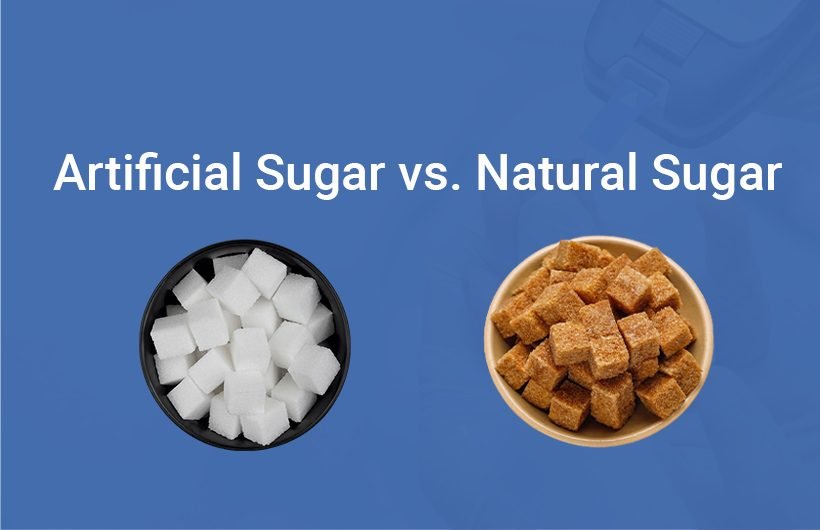When it comes to sweetening our lives, we’re often faced with a choice: artificial sugar vs natural sugar. This becomes even more personal for those who are diabetic or those who want to be healthier in their everyday lives. To understand the specific differences, benefits, and things to consider that might apply to you below to help you know them.
What is Artificial Sugar?
Artificial sugar, also called artificial sweetener, Artificial sweeteners is a term used to describe several sugars chemically produced to suit the taste of sugars with no calories. These are used in diet soft drinks, low-calorie gums, and low-calorie confectionery.
Common Artificial Sugars Include:
- Aspartame – Consumed in diet coke and sugarless chewing gum.
- Sucralose – commonly used in cookies, cakes, candies, brownies and beverages.
- Starch – This is common in table sweeteners, particularly saccharin.
- Acesulfame Potassium – Commonly used in soft drinks and sugar-free candies.
- Stevia (technically natural but often processed) – A plant-originated product used to sweeten food and beverages.
What is Natural Sugar?
Natural sugar is the kind of sugar found in whole foods like fruits, vegetables, and dairy products. It’s naturally occurring and is not processed or added to foods. While artificial sugars are added to foods, natural sugars are part of edible food products.
Common Natural Sugars Include:
- Sucrose – ordinary granulated sugar got from Sugarcane or Sugar beets.
- Fructose – A naturally occurring sugar that can be found in apples, bananas, berries, and several other fruits.
- Lactose – Present in foods of milk origin: excluding animal feed, milk and its products.
- Honey – Obtained by bees and contains certain types of antioxidants.
- Eggs – Used to make white and maple syrup, and are processed for consumption in their natural form.
Artificial Sugar vs. Natural Sugar
Let’s compare these two sweetening options artificial sugar vs natural sugar across various factors:
| Factor | Artificial Sugar | Natural Sugar |
| Source | Chemically manufactured | Derived from plants/animals |
| Calories | Low to zero | High |
| Taste | Similar to sugar but synthetic | Sweet and natural |
| Processing | Highly processed | Minimal (in most cases) |
| Blood Sugar Impact | Minimal to none | Can cause blood sugar spikes |
| Usage | Common in diet products | Found in whole foods |
| Health Risks | Potential for side effects | Nutritional benefits in moderation |
How Artificial Sugar Affects Blood Sugar
Artificial sugars are designed to provide sweetness without increasing blood glucose levels. For people with diabetes, this can be an advantage as these sweeteners have a negligible glycemic index. However, some studies suggest that excessive consumption may lead to:
- Increased cravings for sweet foods.
- Potential disruption of gut microbiota.
- Risk of long-term metabolic issues.
How Natural Sugar Affects Blood Sugar
Natural sugars, especially when consumed in whole food forms like fruits or dairy, come with essential nutrients such as fiber, vitamins, and minerals. These nutrients help regulate blood sugar spikes. However, consuming concentrated sources like table sugar or honey in excess can:
- Elevate blood sugar levels rapidly.
- Contribute to weight gain and insulin resistance.
Pros and Cons of Artificial Sugar
Pros:
- Low or zero calories.
- Good for diabetes.
- Doesn’t cause tooth decay.
Cons:
- Artificial taste.
- Possible complications such as head or stomachache.
- Few post-market data are available on safety.
Pros and Cons of Natural Sugar
Pros:
- Whole and with minimal processing.
- When included as a component of whole food, the nutrient delivery accomplished by these encapsulated blends is beneficial.
- Better flavour profile.
Cons:
- High-calorie content.
- May lead to increased blood sugar levels.
- It is known to cause some level of tooth decay, or more appropriately, is detrimental if taken in large quantities.
Which One is Better Artificial sugar vs Natural sugar for Type 2 Diabetic Patients?
- Artificial sugar: is often the better choice for managing blood sugar levels because it doesn’t raise blood sugar and has fewer calories. However, it’s important to use artificial sweeteners in moderation and as part of an overall healthy diet.
- Natural sugar: Natural sugar from whole foods like fruits can still be part of a healthy diet for people with Type 2 diabetes, but portion control is key to avoiding spikes in blood sugar.
It’s always a good idea for people with diabetes to consult a diabetes specialist in Ahmedabad about the best approach to managing sugar intake.
FAQs
Are natural sweeteners healthier than sugar?
Natural sweeteners can be a healthier option because they often contain more nutrients (like vitamins and minerals) compared to regular sugar, which has no nutritional value. Some natural sweeteners, like honey and maple syrup, also have antioxidant properties.
Is fruit sugar good than artificial sugar?
Yes, fruit sugar is generally better than artificial sugar because it comes with essential nutrients like vitamins, minerals, and fiber. It has a slower impact on blood sugar levels and supports overall health. Artificial sugars, while lower in calories, lack these nutrients and may have side effects. For a healthier option, fruit sugar is the better choice.
Conclusion
Now, let us look at artificial sweeteners vs natural sweeteners and decide which one to take depending on your objective and diet. Though artificial sugar substitutes control caloric and glycaemic densities, natural sugar retains nutritive value if taken in moderation. Balancing between the portions of the nutrients coming from the whole unprocessed foods, and portion control is the main idea when it comes to a healthier diet.
Looking for expert guidance on diabetes management and sugar intake among artificial sugar vs natural sugar? Dr. Moxit Shah provides personalized advice tailored to your health needs. Book a consultation today to take control of your health!






